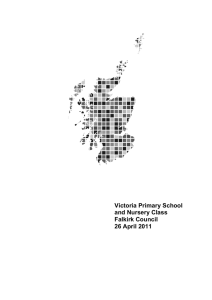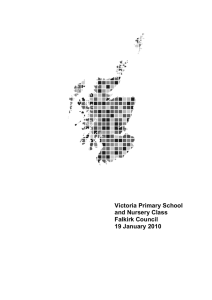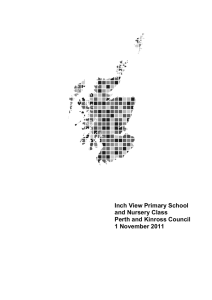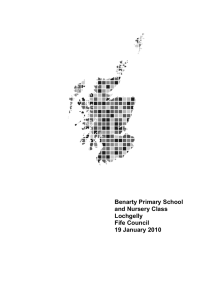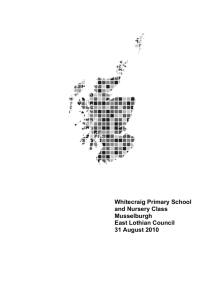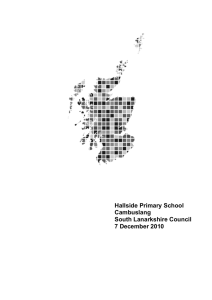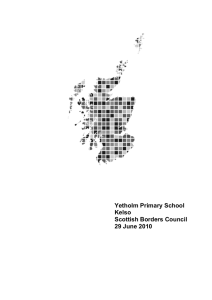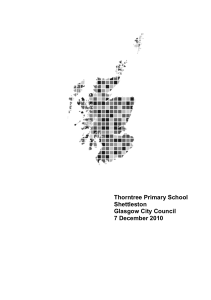Ladeside Primary School and Nursery Class Larbert
advertisement
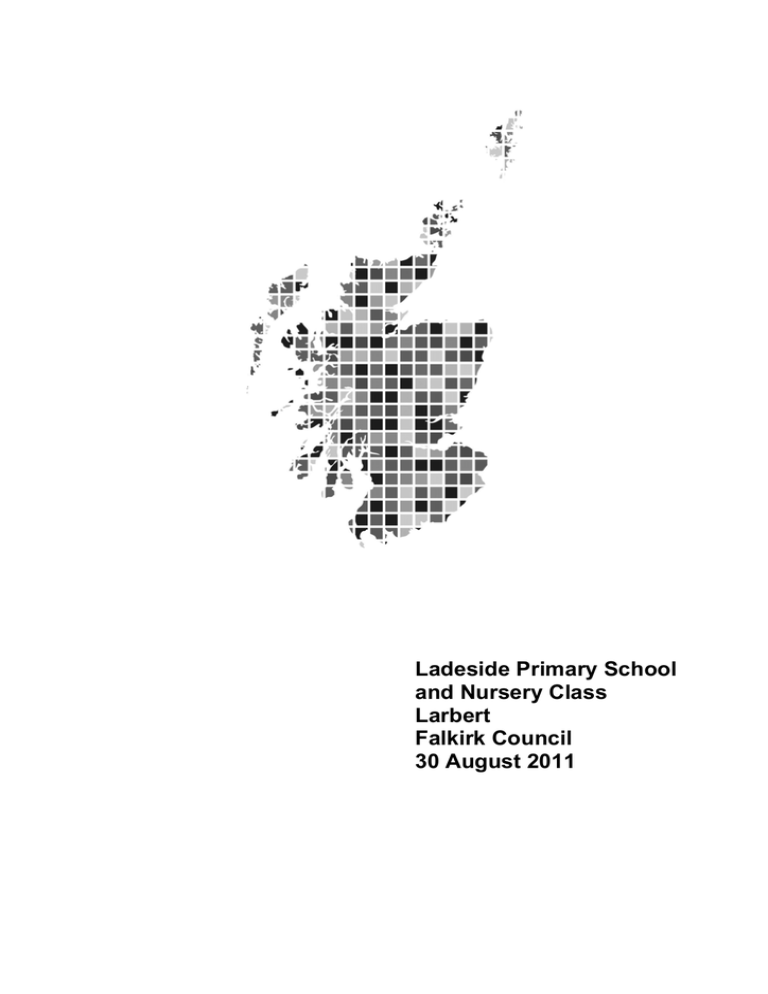
Ladeside Primary School and Nursery Class Larbert Falkirk Council 30 August 2011 HM Inspectorate of Education (HMIE) inspects schools in order to let parents1, children and the local community know whether their school2 provides a good education. Inspectors also discuss with school staff how they can improve the quality of education. At the beginning of the inspection, we ask the headteacher and staff about the strengths of the school, what needs to improve, and how they know. We use the information they give us to help us plan what we are going to look at. During the inspection, we go into classes and join other activities in which children are involved. We also gather the views of children, parents, staff and members of the local community. We find their views very helpful and use them together with the other information we have collected to arrive at our view of the quality of education. This report tells you what we found during the inspection and the quality of education in the school. We describe how well children are doing, how good the school is at helping them to learn and how well it cares for them. We comment on how well staff, parents and children work together and how they go about improving the school. We also comment on how well the school works with other groups in the community, including services which support children. Finally, we focus on how well the school is led and how staff help the school achieve its aims. If you would like to learn more about our inspection of the school, please visit www.hmie.gov.uk. Here you can find analyses of questionnaire returns from children, parents and staff. We will not provide questionnaire analyses where the numbers of returns are so small that they could identify individuals. 1 Throughout this report, the term ‘parents’ should be taken to include foster carers, residential care staff and carers who are relatives or friends. 2 The term ‘school’ includes the nursery class or classes where appropriate. Contents 1. The school 2. Particular strengths of the school 3. How well do children learn and achieve? 4. How well do staff work with others to support children’s learning? 5. Are staff and children actively involved in improving their school community? 6. Does the school have high expectations of all children? 7. Does the school have a clear sense of direction? 8. What happens next? 1. The school Ladeside Primary School is a non-denominational school with a nursery class and a Base to support learners with autism spectrum disorders. It serves parts of Larbert and Stenhousemuir. The roll was 373, including 60 in the nursery, when the inspection was carried out in May 2011. Children’s attendance was in line with the national average in 2009/2010. 1 2. Particular strengths of the school • The calm, orderly atmosphere and the positive behaviour and attitudes to work of children. • Welcoming and inclusive ethos and the range of partnerships with the wider community. • Enthusiasm and commitment of all staff in taking forward improvements to the curriculum and approaches to learning. • Successful integration of children from the Base in the life and work of the school. • Leadership and drive of the headteacher and her senior staff. 3. How well do children learn and achieve? Learning and achievement In the nursery, children are happy, developing confidence and are forming friendships. They enjoy outdoor activities and are learning to take turns when playing games. They are capable of being more independent in their learning. Across the school, almost all children are enthusiastic, keen to learn and have positive attitudes to their work. They listen attentively to teachers and other adults and remain on task throughout lessons. Interactions between teachers and pupils are very good. Children work very well together in group activities. They respond enthusiastically to frequent opportunities to take responsibility for their own learning. Almost all children enjoy being at school and feel very safe and well cared for. They are consulted regularly about their views and are treated with equality, fairness and respect. The children in the Base benefit from working alongside their 2 mainstream peers. Staff place an appropriate emphasis on developing communication skills, including sign language, and use appropriate strategies to manage behaviour. Across the school, including the Base, all children are offered many opportunities to be successful in their learning and wider achievements. Nursery children are involved in a variety of enterprise and fundraising activities, including growing and selling plants. At the primary stages, children are actively involved in a wide range of sports and cultural activities in which they enjoy significant success. A group of P4 to P7 children recently put on a highly successful public performance of acting, song and dance. The school choir performs very successfully at local venues throughout the year. Children are developing skills as responsible citizens by taking on roles on the pupil council, the eco group and as buddies. Children in the nursery are making good progress in early language and mathematics. Most speak confidently in group activities and listen well to favourite stories. Older nursery children recognise their name in print. Children are developing good counting skills. They can name and match simple shapes. They now need to develop further their early language and mathematical skills in all areas of their play. At the primary stages, almost all children are making good progress in developing literacy skills. Children listen very well to each other and their teachers. They respond well to instructions and cooperate well in pairs and group discussions. Children at the early stages are strongly motivated in reading activities and are able to use new vocabulary in their writing. Senior pupils are able to talk confidently about a variety of types of text and their favourite authors. Children at all stages respond well to good opportunities to write for a range of purposes. Children in the Base are making good progress in developing their communication skills. Across the school, most children demonstrate good skills in mental calculations, appropriate to stage. By P7, they work confidently with weight, direction, time and money. Across the stages, most children have good knowledge of two-dimensional shapes and three-dimensional objects. They have used graphs to display the results of research in topics. Most children have a good 3 understanding of problem-solving strategies and can use them to solve a range of problems and challenges. At all stages and in the Base, children’s skills in using information and communications technology in mathematics are developing well. Curriculum and meeting learning needs The nursery curriculum is based on active learning and play. Children have good opportunities to listen to stories and to make marks. They are able to develop early mathematics skills in group counting, table top games and baking. Staff provide a good range of activities to develop children’s physical skills. They now need to extend the use of the outdoor area. Across the school and in the Base, staff plan their programmes taking full account of the principles and purposes of Curriculum for Excellence. Teachers embed aspects of literacy, numeracy and health and wellbeing across other subject areas. The school has consulted pupils, parents, and staff on improvements to the curriculum. Staff provide a good variety of learning experiences, including environmental and enterprise activities. Visiting specialists in French, music, drama and physical education provide good quality learning experiences for children. The school is not yet able to provide two hours of high quality physical education for all children. Aspects of the programmes for social studies and religious and moral education include opportunities to promote aspects of equality and diversity. Transitions from nursery to primary and P7 to S1 are well planned to ensure continuity of learning. Nursery staff provide a caring and supportive learning environment. Learning activities are matched well to the needs of most children. There is scope to increase the choice of resources and activities available to ensure all children are appropriately challenged. Across the school and the Base, all staff know their children very well. Tasks and activities meet the needs of almost all children. The school uses effective approaches to identify, monitor and support children with additional learning needs. The support for learning teacher supports groups and individuals very effectively. She liaises with teachers and support for learning assistants and advises them on helpful strategies. 4 Staff provide targeted support for children with individualised educational plans (IEPs). The targets in IEPs are appropriate and are reviewed regularly. Staff have developed effective partnerships with a range of agencies to support children with additional learning needs. The school’s transition processes include appropriate support for those with learning needs. Regular homework includes appropriate tasks from across the curriculum. 4. How well do staff work with others to support children’s learning? The school maintains good communications with parents and consults them regularly. The Parent Council and parent-teacher association are very active and supportive of the school. The Parent Council is directly involved in improving aspects of learning. The school communicates well with parents through e-mails, group call, the website and frequent newsletters. Nursery staff keep parents well informed about children’s progress. Parents have responded positively to the school’s development of learning logs as a means of recording and reporting on the progress of their children. School events are very well attended and parents contribute well to fundraising activities. The school has very good links with Larbert High School and other primary schools in the area. The school has two chaplains, both of whom contribute to regular assemblies. The school has very well-developed partnerships with a wide range of educational support agencies. The school benefits from links with a range of local businesses, the local Rotary Club and Round Table. 5. Are staff and children actively involved in improving their school community? All staff show clear commitment to reflective practice and continuous improvement. They use annual reviews to identify strengths and areas for improvement. They share good practice regularly and all are members of staff working groups which take forward developments in 5 learning and the curriculum. Senior managers and staff are examining ways of tracking attainment and progress in Curriculum for Excellence levels. Staff have agreed and shared with parents a revised approach to reporting to take account of these changes. Senior staff observe classroom practice regularly and provide helpful written feedback to staff. They know their staff very well and use this knowledge to help plan appropriate in-service training. The school gathers the views of children and parents as part of the school’s improvement planning process. The priorities and targets in the improvement plan are appropriate to the needs of the school and are reviewed and updated regularly. 6. Does the school have high expectations of all children? The school is very welcoming and has an inclusive and caring ethos. Children feel safe and well cared for in school. The headteacher and her staff set high expectations of all children for learning, achievements and behaviour. Children have high expectations of themselves and respond well to challenges and responsibilities. They are proud of their school and their own achievements. The school celebrates achievements at regular assemblies, on attractive wall displays, in newsletters and on the school website. The school has appropriate systems and policies for the care and welfare of children, including child protection, safe Internet use, and anti bullying. The school helps children to develop their understanding of healthy lifestyles. The school provides appropriate religious observance. All teachers and support staff are trained annually in child protection issues and are clear about their responsibilities. The school takes appropriate and immediate action if children are absent from school without explanation. 7. Does the school have a clear sense of direction? The headteacher provides strong and very effective leadership. She is committed to the school and its continuous improvement. She knows 6 the strengths of her staff and the areas where improvements are needed. The headteacher has a clear understanding of appropriate strategies to tackle the challenges facing the school. She has been very successful in sharing that vision with all members of staff and in managing improvements. She has used good interpersonal skills to earn the loyalty of staff and develop strong teamwork amongst them. Increasingly, teachers are taking on leadership roles to lead working groups and enhance approaches to learning. The headteacher is very ably supported by her equally committed depute headteachers and principal teacher. All have varied and challenging remits which they carry out very effectively. Together they are continuing to develop teamwork among staff and set high expectations for further improvements. 8. What happens next? As a result of the very good quality of education provided by the school, we will make no further visits in connection with this inspection. The education authority will inform parents about the school’s progress as part of the authority’s arrangements for reporting to parents on the quality of its schools. We have agreed the following areas for improvement with the school and education authority. • Continue to develop approaches to monitoring and tracking children’s progress with a focus on raising attainment further. At the last Care Commission inspection of the nursery class there were two recommendations, both of which had been addressed. 7 Quality indicators help schools and nursery classes, education authorities and inspectors to judge what is good and what needs to be improved in the work of a school and a nursery class. You can find these quality indicators in the HMIE publications How good is our school? and The Child at the Centre. Following the inspection of each school, the Scottish Government gathers evaluations of three important quality indicators to keep track of how well all Scottish schools and nursery classes are doing. Here are the evaluations for Ladeside Primary School and Nursery Class. Primary school Improvements in performance Learners’ experiences Meeting learning needs good very good very good Nursery class Improvements in performance Children’s experiences Meeting learning needs good good good We also evaluated the following aspects of the work of the school and nursery class. The curriculum Improvement through self-evaluation HM Inspector: Jim Bruce 30 August 2011 8 very good very good When we write reports, we use the following word scale so that our readers can see clearly what our judgments mean. excellent very good good means means means satisfactory weak unsatisfactory means means means outstanding, sector leading major strengths important strengths with some areas for improvement strengths just outweigh weaknesses important weaknesses major weaknesses If you would like to find out more about our inspections or get an electronic copy of this report, please go to www.hmie.gov.uk. Please contact us if you want to know how to get the report in a different format, for example, in a translation, or if you wish to comment about any aspect of our inspections. You can contact us at HMIEenquiries@hmie.gsi.gov.uk or write to us at BMCT, HM Inspectorate of Education, Denholm House, Almondvale Business Park, Almondvale Way, Livingston EH54 6GA. Text phone users can contact us on 01506 600 236. This is a service for deaf users. Please do not use this number for voice calls as the line will not connect you to a member of staff. You can find our complaints procedure on our website www.hmie.gov.uk or alternatively you can contact our Complaints Manager, at the address above or by telephoning 01506 600259. Crown Copyright 2011 HM Inspectorate of Education
